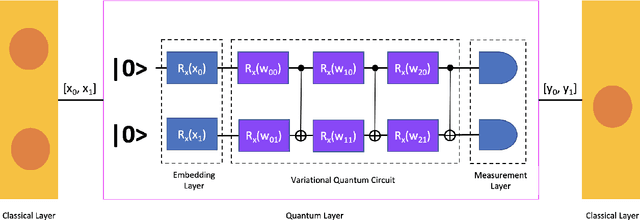Sanjesh Pawale
A Classical-Quantum Convolutional Neural Network for Detecting Pneumonia from Chest Radiographs
Feb 19, 2022



Abstract:While many quantum computing techniques for machine learning have been proposed, their performance on real-world datasets remains to be studied. In this paper, we explore how a variational quantum circuit could be integrated into a classical neural network for the problem of detecting pneumonia from chest radiographs. We substitute one layer of a classical convolutional neural network with a variational quantum circuit to create a hybrid neural network. We train both networks on an image dataset containing chest radiographs and benchmark their performance. To mitigate the influence of different sources of randomness in network training, we sample the results over multiple rounds. We show that the hybrid network outperforms the classical network on different performance measures, and that these improvements are statistically significant. Our work serves as an experimental demonstration of the potential of quantum computing to significantly improve neural network performance for real-world, non-trivial problems relevant to society and industry.
 Add to Chrome
Add to Chrome Add to Firefox
Add to Firefox Add to Edge
Add to Edge